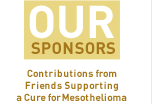VEGLIN
Veglin is an anti-angiogenesis non-chemotherapy drug (angiogenesis inhibitor) that was developed by VasGene Therapeutics, Inc. for the treatment of a variety of malignancies including mesothelioma. Veglin is one of several newly developed non-chemotherapy drugs being tested for possible utilization in the ongoing struggle to combat malignant mesothelioma.
Veglin is an antisense oligonucleotide that binds with DNA genes that are responsible for the production of proteins called Vascular Endothelial Growth Factors (VEGF), with the intention of inhibiting their production.
Veglin Clinical Trials
Veglin underwent Phase II clinical trial testing at the University of California's Keck School of Medicine through 2010. As of November 14, 2011 we are waiting on FDA approval to resume additional Phase II testing. Preliminary results from Phase I were presented in 2004 at the 40th Annual Meeting of the American Society of Clinical Oncology. These results demonstrated Veglin's ability to lower the levels of proteins required for tumor growth and in periodically stabilizing / reducing tumors in some instances. Veglin was successful in lowering blood levels of VEGF-A and VEGF-C (types of VEGF proteins) in 47% and 21% of the trial's 35 patients. VasGene and Keck officials were extremely happy with these results.
Veglin Phase II clinical trials have revolved around patients suffering from renal cell carcinoma, mesothelioma, leukemia and lymphoma. Participants are administered Veglin intravenously for two hours over a period of five days, followed by seven days without any type of treatment. This cycle is to be continued for approximately four months. It is expected that Veglin Phase II clinical trials will have similar successes as those yielded by Phase I.
About Angiogenesis - Angiogenesis Drugs
Angiogenesis refers to the physiological process by which new blood vessels are formed from existing blood vessels. Angiogenesis is a natural process of cellular growth and development; however, it also fuels tumor metastasis (spread and growth of cancer). Tumors have a limited capacity to grow unaided. In order to continue to grow and metastasize, tumors require a continuous flow of oxygen and essential nutrients. In order for tumors to receive such a continuous flow, they require blood vessel growth into the cancerous mass. Tumors induce the required blood vessel growth by secreting a variety of growth factors (VEGF). It is believed (and proven effective in certain animal trials) that preventing the formation of new blood vessels can prevent the growth and spread of tumors.
As an anti-angiogenesis drug, the goal of Veglin is straightforward; to inhibit the process of angiogenesis from occurring, and with it, the spread of cancer.



For questions related to the foundation and to make contributions please contact:
Executive Director
Toll Free:
(800) 909-Meso (6376)
3011 Townsgate Rd, Suite 450
Westlake Village, CA 91361
For more information and other questions contact:
(800) 909-6376
©2016 Mesothelioma Research Foundation Of America
